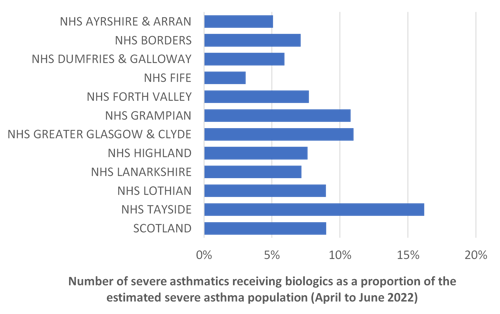Monoclonal antibodies
- Monoclonal antibodies (mAb) are a type of biologic drug that can be used to treat severe asthma.
- They target specific biological processes to reduce inflammation in the lungs and currently either target ‘allergic’ asthma or ‘eosinophilic’ asthma.
- There are various mAbs approved by the Scottish Medicine Consortium (SMC) for Scotland including:
- Benralizumab
- Dupilumab
- Mepolizumab
- Omalizumab
- Tezepelumab
These medications have been shown to significantly reduce asthma exacerbations, hospital admissions and oral corticosteroid use.39-42
- The SMC has set strict eligibility criteria for patients receiving these drugs to ensure that they are used for patients most likely to benefit and in the most cost-effective way. Consequently, mAbs are included in SIGN/BTS and NICE clinical guidance for the treatment of severe asthma.6,7
- It has been previously estimated that 20% of eligible patients with severe asthma, received treatment with mABs in the UK.37 The Accelerated Access Collaborative estimated this as 17-21% of eligible patients in England.43
- A benchmarking exercise was completed across NHS Scotland identifying adult patient numbers prescribed mAbs as a proportion of the estimated severe asthma population (shown in the chart below) showing wide variation in prescribing based on weighted population. A prevalence of 6.4% was assumed for asthma, based on the Scottish Public Health Observatory figures, and severe asthma estimated as 4% of this. Uptake and use of mAbs for the management of severe asthma varies across Scotland. Ongoing work is required to increase early identification, referral and assessment of at-risk patients.
Number of people with severe asthma receiving biologics as a proportion of the estimated severe asthma population

The numerical data for NTI graphs can also be viewed here.
The most up to date national therapeutic indicator data is available here.
